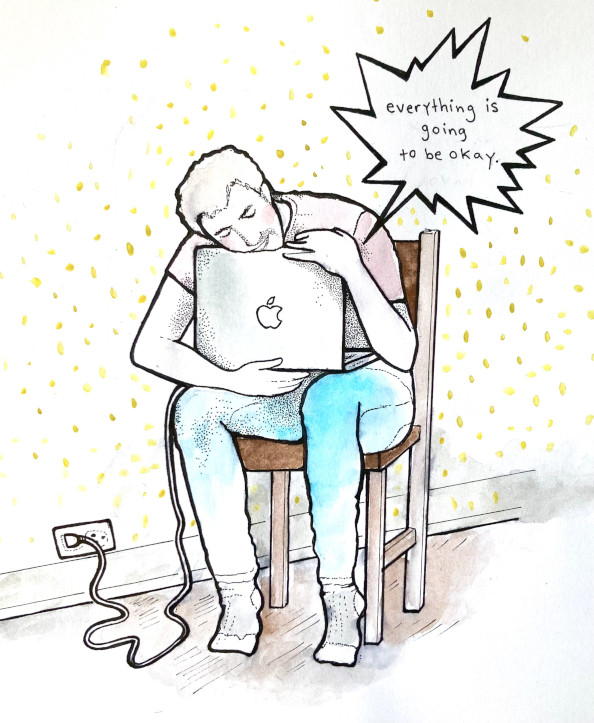Therapy from home actually worked for me
Talking about my darkest feelings to a screen? Sign me up!

Illustrated by Gabrielle Funk
Everyone should have the chance to go to therapy.
Not because we’re all dealing with serious mental illnesses, but because it’s beneficial to talk out tough and negative feelings.
In Canada, going to therapy has become more common throughout the COVID-19 pandemic. With programs from Manitoba’s provincial government, such as a free two-session virtual counselling program and the AbilitiCBT digital therapy program, therapy has become more accessible to adult Canadians.
Online therapy takes a variety of forms. Some programs offer scheduled meetings with a licensed therapist, and others use self-led methods and units, almost like homework, to address mental-health issues.
Certain types of therapy from home, such as cognitive behavioural therapy (CBT), have been clinically proven to be just as effective as in-person methods. Still, there are quite a few people who are skeptical about signing up for therapy that doesn’t involve talking to their therapist face-to-face.
I’ve actually only been to therapy online, and I have to say, I think it’s the way to go. Online therapy has made getting mental-health support more accessible to the general public.
Online therapy sessions allow people who live out of the city or who have physical limitations to easily access mental-health resources. Offering therapy online also lets people choose therapists based on what they want help with and not solely on their location. On top of this, clients save money on transportation.
Personally, I find that therapy from home allows me to be genuine and upfront about my feelings.
My home is comfortable and familiar. It’s the place that I feel the most safe. Any type of medical office, even a therapist’s office, can often feel clinical and unwelcoming.
So, despite only seeing my therapist through a computer screen, I feel I can create a genuine relationship with her.
Like anything in this world, there are downsides to virtual and online therapy.
Some people don’t have safe home environments. I’ve heard stories of people signing up for virtual therapy but attending their sessions inside their cars. Sometimes, a lack of privacy, an unsupportive family or, in the worst cases, domestic abuse stop people from getting the mental-health support they need.
Self-led modules and assignments can also be challenging, as clients are then the ones who have to hold themselves accountable to their progress.
A friend of mine who was enrolled in the AbilitiCBT program told me they had trouble completing the therapeutic units. Depression can make it hard to get out of bed, and having to fulfill therapeutic homework can be next to impossible. Since my friend wasn’t able to complete their units, their therapy file is now closed.
Despite these cons, I still believe that therapy from home is great. I’ve conquered some of my own mental-health issues this past year because of it. With online therapy becoming more accessible, I hope more people can take advantage of resources that are available and get the support they may need.
Kim Uduman is finishing up her bachelor’s degree in rhetoric, writing and communications at the University of Winnipeg. In her downtime, she loves caring for her plants, cuddling her orange tabby cat and attempting latte art.
Published in Volume 76, Number 3 of The Uniter (September 23, 2021)






